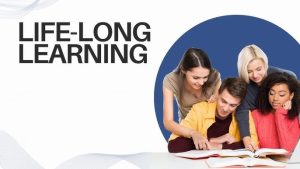Introduction
The world is changing faster than ever. Technology, job markets, and industries evolve constantly, requiring people to adapt, grow, and improve their skills. In this fast-changing world, one of the most important habits anyone can develop is lifelong learning.
Lifelong learning is the ongoing process of acquiring knowledge, skills, and experiences throughout life. It is not limited to formal education but includes self-learning, professional development, and personal growth. By embracing lifelong learning, people can stay competitive in the job market, enhance their personal lives, and remain mentally sharp.
This article explores the importance, benefits, and strategies for lifelong learning. It also provides practical tips on how to develop a habit of continuous learning.
What is Lifelong Learning?

Lifelong learning refers to the continuous pursuit of knowledge and skills beyond formal education. It includes professional development, self-improvement, and intellectual curiosity.
Lifelong learning can take many forms, including:
- Formal learning: Enrolling in online courses, attending workshops, or getting certifications.
- Self-directed learning: Reading books, listening to podcasts, or watching educational videos.
- Experiential learning: Learning through hands-on experience, travel, or hobbies.
The key to lifelong learning is curiosity, open-mindedness, and a willingness to embrace change.
Why is Lifelong Learning Important?

In today’s world, learning does not stop after school or college. Here’s why lifelong learning is crucial:
- Adapting to Change: Rapid technological advancements require people to update their skills to stay relevant in their careers.
- Career Growth: Many industries demand continuous learning to remain competitive in the job market.
- Personal Development: Learning new skills improves confidence, creativity, and problem-solving abilities.
- Mental Agility: Engaging in intellectual activities keeps the brain active and reduces cognitive decline.
- Expanding Opportunities: Learning opens doors to new career paths, hobbies, and experiences.
Key Benefits of Lifelong Learning

1. Enhances Career Growth and Job Security
Employers value individuals who continuously upgrade their skills. In a fast-changing job market, professionals who engage in lifelong learning stay ahead of industry trends and technological advancements.
Example: A software developer who regularly learns new programming languages will have more job opportunities than someone who does not.
2. Improves Problem-Solving Skills
Learning new concepts helps develop critical thinking and problem-solving skills. Whether in the workplace or daily life, these skills are essential for making better decisions.
Example: Learning about personal finance can help individuals make informed investment decisions.
3. Boosts Confidence and Self-Esteem
Gaining new knowledge and skills boosts confidence. People who engage in lifelong learning feel more competent and capable, which increases self-esteem and motivation.
Example: A person learning a new language gains confidence when they can communicate fluently with others.
4. Keeps the Mind Active and Sharp
Lifelong learning helps maintain mental agility and memory retention. Engaging in intellectual activities reduces the risk of cognitive decline and dementia.
Example: Older adults who read, solve puzzles, or learn new skills have better memory and cognitive function.
5. Encourages Creativity and Innovation
Continuous learning fuels creativity and innovation. Exposure to new ideas and perspectives helps develop fresh solutions to problems.
Example: Entrepreneurs who learn about different industries often develop innovative business ideas.
6. Enhances Social Connections and Networking
Learning new things allows individuals to connect with like-minded people. Taking courses, attending seminars, or joining discussion groups expands social and professional networks.
Example: A business professional attending leadership workshops builds connections that help in career advancement.
How to Develop a Habit of Lifelong Learning

1. Set Learning Goals
Identify what you want to learn and why. Setting clear learning goals helps maintain focus and motivation.
Example
- Short-term goal: Learn basic coding in 3 months.
- Long-term goal: Get certified in digital marketing within a year.
2. Create a Learning Schedule
Dedicate time for learning just like any other important activity. Even 15-30 minutes a day can make a significant difference.
Example
- Read a book for 20 minutes before bed.
- Listen to educational podcasts while commuting.
3. Use Online Learning Platforms
Technology makes learning accessible to everyone. Some top platforms include:
| Platform | Best For | Features |
|---|---|---|
| Coursera | Professional courses | University-level courses |
| Udemy | Skill-based learning | Affordable and flexible |
| LinkedIn Learning | Career growth | Business and tech skills |
| Duolingo | Language learning | Free and interactive |
| Khan Academy | General knowledge | Free courses for all ages |
4. Read Books and Articles
Books are an excellent source of knowledge. Reading about history, business, psychology, or self-development broadens perspectives.
Example
- “Atomic Habits” by James Clear: Teaches how small changes create lasting success.
- “The Power of Now” by Eckhart Tolle: Helps with mindfulness and self-awareness.
5. Engage in Meaningful Conversations
Surround yourself with curious and knowledgeable people. Discussing ideas with others enhances learning and broadens perspectives.
Example
- Join a book club or a professional networking group.
- Participate in webinars and discussions.
6. Practice What You Learn
Knowledge is valuable only when applied. Find ways to use new skills in real life.
Example
- If learning a new language, practice speaking with native speakers.
- If taking a leadership course, apply strategies in the workplace.
The Importance of Lifelong Learning
Lifelong learning is important because it helps people stay relevant in their careers. As jobs change and new technologies emerge, those who keep learning can adapt and thrive. Learning new skills can also make individuals more valuable to employers, opening doors to new job opportunities and promotions. This constant growth is key to long-term success in any field.
Personal Satisfaction through Learning

Learning new things can be very satisfying and enjoyable. Many people find joy in discovering new ideas or mastering a skill. Lifelong learning allows individuals to explore their interests and passions, which can lead to a more fulfilling life. This personal satisfaction boosts overall happiness and well-being, making it an important part of life.
Challenges of Lifelong Learning
While lifelong learning has many advantages, it also comes with challenges. Many people struggle to find time to learn amidst work and family commitments. Others may feel overwhelmed by the vast amount of information available. Additionally, some individuals may face financial barriers when it comes to accessing learning resources or courses.
Future of Lifelong Learning

The future of lifelong learning looks promising as technology continues to make learning more accessible. Online courses and resources are becoming more popular, allowing people to learn at their own pace and convenience. As society recognizes the value of continuous education, lifelong learning will likely become an essential part of personal and professional success for many individuals.
Comparative Table: Lifelong Learning vs. Traditional Learning
| Aspect | Lifelong Learning | Traditional Learning |
|---|---|---|
| Duration | Ongoing, throughout life | Fixed, usually within a set time |
| Flexibility | Self-paced, fits individual needs | Structured, often less flexible |
| Learning Environment | Various, including online and informal settings | Formal, often in classrooms |
| Purpose | Focused on personal and professional growth | Aimed at academic achievement |
| Approach | Emphasizes self-motivation and curiosity | Centers around following a curriculum |
Analysis Table: Lifelong Learning in Different Stages of Life
| Stage of Life | How to Learn | Benefits |
|---|---|---|
| Students | Online courses, books, skill development | Academic success, career readiness |
| Working Professionals | Certifications, seminars, mentorships | Career growth, salary increase |
| Retirees | Reading, hobbies, volunteering | Mental agility, social engagement |
Regardless of age, lifelong learning brings personal and professional benefits.
Conclusion
In conclusion, the benefits of lifelong learning are clear and wide-ranging. From better job opportunities to personal growth, career success, and mental well-being, committing to continuous learning is vital in a fast-changing world. By embracing learning, individuals can not only keep up with change but also thrive in their personal and professional lives. It helps individuals adapt, innovate, and stay competitive.
Key Takeaways
- Lifelong learning keeps the mind sharp and improves problem-solving skills.
- Continuous learning enhances career opportunities and job security.
- Engaging in intellectual activities boosts creativity and confidence.
- Learning is flexible and can fit into any schedule.
- Applying knowledge in real life is the best way to retain it.




